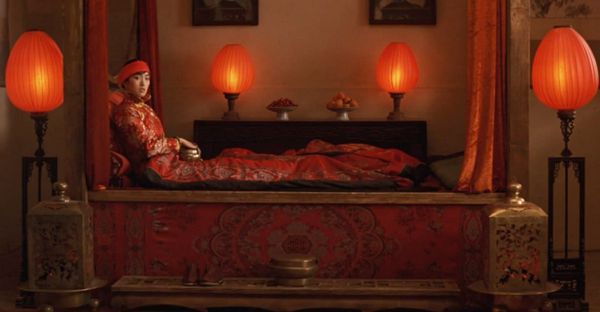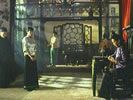Eye For Film >> Movies >> Raise The Red Lantern (1991) Film Review
Raise The Red Lantern
Reviewed by: Amber Wilkinson

Zhang Yimou’s films are the cinematic equivalent of a set of Russian dolls – just as you are admiring the surface, you spot a crack which opens to reveal yet another layer of meaning, which upon inspection, yields yet further levels of interest.
Raise The Red Lantern is no exception. On the surface it deals with the story of Songlian (Gong Li), an educated girl, who is harried by her stepmother into becoming the fourth concubine of a rich older man.

On arrival at its house, she discovers she must share a courtyard, flanked by houses belonging to the master’s other three concubines. Each night, the master chooses the concubine he will sleep with, who is then treated to the best foot massage ritual can buy, as the red lanterns of the film’s title are raised at her house. This ‘competition’ for favours sets the scene for conflict and betrayal.
Steeped in tradition, the women – along with their servants, one of whom is desperately jealous of Songlian – are like beautiful birds in a cage, pampered and fed but with little else to occupy their time. The eldest, Yuru (Shuyuan Jin) has borne the master a son and is used to the vagaries of the household, having long since lost the power to persuade him to raise the red lantern at her abode. Second wife Zhouyan (Cao Cuifen), meanwhile, has only managed to bring forth a “useless girl”, yet seems resigned to her fate, playing third fiddle to feisty opera-singing second wife Meishan (He Caifei) – also the mother of a son - and newcomer Songlian.
The alliances of the household are like shifting sand as each woman vies for attention, with underhand tactics – no matter how spiteful - always an option.
Like Yimou’s previous film Ju Dou, colour is vastly important. Printed using the Technicolor dye-transfer process, this lends the all-important reds an added vividness. The lanterns splash against the fort-like courtyard, symbolising life in grim surroundings. Equally important to the film, however, is sound. The noise of the ‘lucky’ concubine receiving her foot massage echoes through the homes of the other three, making them squirm with jealousy and rage, while the opera singing of Meishan – the bird who refuses to let her voice fall silent – and flute playing of Yuru’s son, come at pivotal moments.
Each character is fully realised – except for the master, deliberately reduced to a distant figure who we never get a good look at. Songlian is by turns a tragic heroine, a little girl lost and a scheming witch, and the other women’s characters are equally complex.
Although, on one level a simple melodrama, there is much more going on beneath the surface of Yimou’s film. Not only a stinging indictment of China’s treatment of women – here, little more than pampered pets, no longer mistresses of their own fate - the film can also be viewed as a more general attack on the political systems in China, with the women representing the ‘common man’ forced to adhere to political ‘rules’ which are so draconian that corruption is almost bound to ensue. Small wonder then that it was initially banned there on release.
With its beautiful look and haunting themes and sublime performances, Raise The Red Lantern is Yimou’s master work – the chance to see it on the big screen at the Cinema China festival should not be missed.
Reviewed on: 12 Mar 2007
















